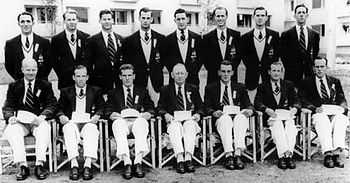Phil Cayzer
| Medal record | ||
|---|---|---|
| Men's Rowing | ||
| Olympic Games | ||
| Bronze | 1952 Helsinki | Men's eight |
| British Empire Games | ||
| Gold | 1950 Auckland | eights |
Philip Arthur Cayzer OAM, (born 13 May 1922) is an Australian former national champion rower who won medals in the 1952 Summer Olympics and the 1950 British Empire Games. He coached at State and national representative level taking Australian Olympic crews to success in the 1960s.
Rowing career
Cayzer was schooled at St Joseph's College, Hunters Hill and his senior rowing was done with the Sydney Rowing Club with whom Cayzer would have a lifelong association.[1] During the 1970s in Melbourne he would be a senior clubman at the Mercantile club.
He stroked the New South Wales representative VIII in the King's Cup at the Australian Rowing Championships on five occasions from 1948 to 1954 winning the national championship in 1949, 1950 and 1951.
At the 1950 Empire Games he won the gold medal as part of the Australian boat in the eights competition. In 1952 he was the strokeman of the Australian boat which won the bronze medal in the eights event at the Helsinki Olympics.
Coaching career
After retiring from rowing Cayzer took up coaching. He was the Senior Coach at the SRC for most for the sixties while also coaching numerous New South Wales representative Kings Cup crews. He coached the coxed four of Alf Duval, Alan Grover, Mick Allan, John Campbell and Gary Herford selected to compete at Tokyo 1964. He drove Sydney Rowing Club's association with Olympic representative crews recruiting a number of national senior rowers to join Duval, Grover and Joe Fazio at Sydney to create the men's eight for the 1968 Summer Olympics. He coached the crew both in Australia and in Mexico.[2]
In the 1970s Cayzer relocated to Melbourne for business and became actively involved at the Mercantile club, rowing in social crews and becoming one of the club's most senior coaches. He returned to Sydney in the 1980s and continued to coach Club, state and national crews till the early 2000s.[3]
